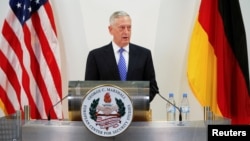U.S. Defense Secretary Jim Mattis is in Brussels, where he will consult with NATO allies on troop contributions and other support for Afghanistan, before announcing his own policy plan for the war-torn country.
The Pentagon has promised a new Afghanistan plan by mid-July, and Michael O’Hanlon, a senior defense analyst at the Brookings Institution, expects the new plan will not be a “repeal and replace” strategy, but rather a reformation of the Obama administration’s plan.
“Mattis and Trump are just repairing a mistake, in effect, that I think President Barack Obama made. And it is, in a sense, more properly carrying out Obama’s own strategy than Obama himself did,” O’Hanlon told VOA.
The strategy will still focus on Afghan troops taking the lead on security in the country, a critical point in the Obama administration’s military efforts since June 2013. But O’Hanlon explains why he thinks the past president made a mistake when he cut American military support in the country from about 100,000 U.S. troops in May 2011 to fewer than 10,000 American troops over a four-year span.
“That was probably too fast and too low, so by restoring just a few thousand more, I think we can get advisers out in the field with some of the key Afghan units and hopefully really stabilize the situation,” said O’Hanlon.
U.S. Marine Gen. Joseph Dunford, America’s top general, arrived Monday in Afghanistan with a mission to pull together the final elements of a military strategy that likely will include sending about 4,000 more U.S. troops into the country.
Mattis is expected to meet with General John Nicholson, the commander of international forces in Afghanistan, ahead of the NATO defense ministers meeting, where he will press some allies to increase their commitments to Afghanistan.
“We have to think about what else they can bring to bear to help,” Chief Pentagon spokesperson Dana White told VOA last week. “I know everyone wants to know what’s going to happen, but the secretary is being very deliberative and very thoughtful about what the commanders need and what’s necessary to change the tide.”
Officials say the new strategy also will need to provide the necessary resources for the American-led coalition to support Afghan forces at lower levels in the military chain of command. In addition, they say it will need to stop elements of Pakistan’s government from propping up the Taliban, and it will need to stop Islamic State’s local affiliate from growing.
“It’s not getting better in Afghanistan in terms of ISIS. We have a problem, and we have to defeat them and we have to be focused on that problem,” White said.
Analysts say the group’s operational capabilities have been severely stinted, despite an increase in militant numbers, due to the pressing need to defend themselves from both U.S. and Afghan attacks.




